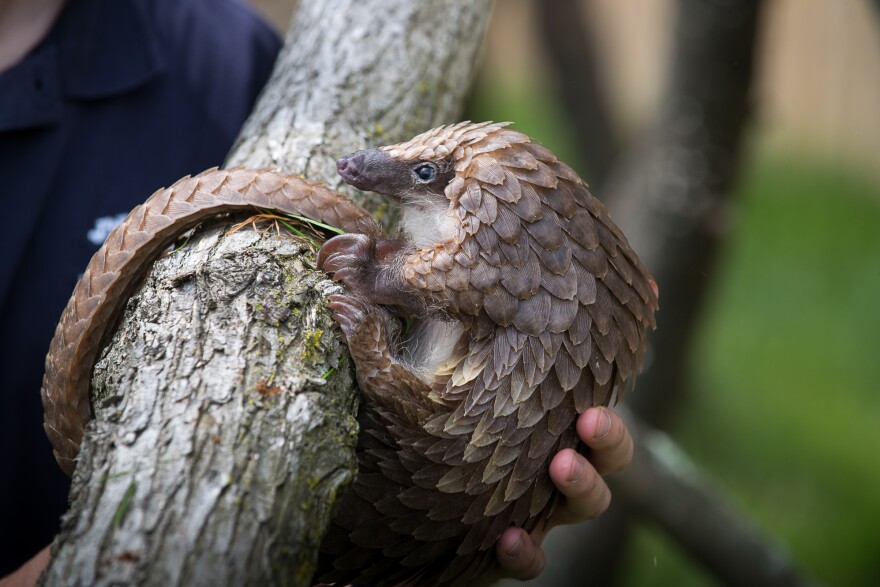At the Pittsburgh Zoo & PPG Aquarium, inside a tall concrete room, kept warm and humid, is a series of cages filled with the most illegally trafficked animal in the world: the pangolin.
When the cage is opened to a female white-bellied tree pangolin, it’s clear by the soft but sharp hissing of the small creature that she isn’t thrilled to have visitors. Her sleek, snake-like body cautiously moves down a sideways log toward the end of the enclosure.
“One of the things about pangolins is there’s so little we know about them because they are nocturnal and they are secretive,” said Ken Kaemmerer, curator of mammals at the zoo, while pointing to the animal’s tail as it hooked around the log.
Kaemmer is very excited about the three pangolins the zoo acquired earlier this year. He said he really wants to save them and thinks having them in zoos is a great way to start.

Each year, millions of pangolins are killed for their meat and their scales, which some cultures believe have medicinal qualities. It’s difficult to determine just how many pangolins are left because of the demand—and animal experts can’t agree on how to save them.
Jeffrey Flocken, with the International Fund for Animal Welfare, thinks having pangolins in zoos is the wrong approach.
“We are trying our hardest to stop the poaching, stop the trafficking and stop the demand,” Flocken said.
“Unfortunately when zoos buy wild-caught pangolins, they’re adding to the poaching, the trafficking and the demand.”
Flocken said moving pangolins from their habitats in Asia and Africa can be incredibly stressful for them. He estimates that for every pangolin transported to a North American zoo, several die in the process.
“The real goal is not to get the individuals used to being in captivity,” Flocken said. “But, in fact, bringing them back to the health, then go right back into the wild.”
Flocken wants zoos to stay out of the pangolin conservation business. He says on the ground, pangolins can eat their natural diet of ants and termites—they don’t need supplements. They’re also living in the wild, not a fabricated zoo environment. So far, there is no record of any captive-bred births in North America.
But Justin Miller, founder of Florida-based Pangolin Conservation, who provided the Pittsburgh pangolins, says the benefits of having the species in zoos outweigh the negatives.
“From the start of this project, it was pretty much asking what had failed in the past? What were the reasons?” Miller said. “And then, are we able to correct those?”
Miller says he’s created a captive diet that the pangolins enjoy and will slurp up with their super-long tongues. And he says he takes time with the pangolins he catches and he conditions them to recognize humans before they’re moved. Having pangolins in zoos, he says, is important because that’s where scientists can study their mating, gestation and their behavioral patterns.
Plus, millions of people visit zoos each year. Miller says he hopes by spreading the word about pangolins, it’ll create an awareness of the trafficking.
Kaemmerer says the Pittsburgh Zoo's three wild-caught pangolins will live in a naturalistic environment when they go on display, but that won’t be for another two or three years.





